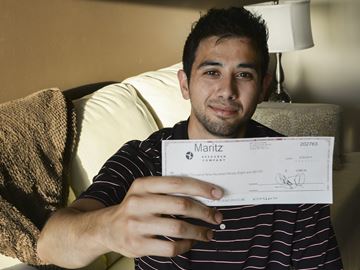A Milton couple is speaking out after recently thwarting a fraud attempt that could have resulted in them being out thousands of dollars.
Stay-at-home mother Kasia Kuczkowska was surprised a few weeks ago when she checked the mail and found a letter addressed to her from a U.S.-based market research company.
Inside was a $3,998.90 cheque and letter allegedly from Maritz Research, asking she deposit the money into her bank account and transfer funds to two separate addresses in New York.
She was told to keep the remaining balance, approximately $800, as payment for her services.
Kuczkowska said she’s never heard of Maritz Research and immediately thought the letter was “suspicious.”
“I was confused. Why was this mailed to me directly? I didn’t understand how they found my address; how did they get my information,” Kuczkowska said.
Suspecting the scheme was likely bogus, Kuczkowska’s husband Alex Anabusi called the phone number for the RBC Royal Bank branch in Toronto listed on the cheque and confirmed the couple’s theory.
“Their response was yes it is a scam… thank you for alerting us and we’re going to get security on this to try and figure out where this is coming from,” Anabusi said.
An RBC spokesperson said they haven’t heard of any another similar cases where a suspicious cheque has listed one of their branch addresses.
Not an 'inside job'
An advisory posted on the Maritz website warns people that the cheques aren’t from their company and that it’s in fact a scam.
It also states that any authorized communication will come from a Maritz email address and the company “rarely, if ever” requires people to cash cheques and wire money.
Maritz Director of Communications Laura McAllister said the company is “concerned about protecting our reputation in the industry” and wants to make sure innocent parties aren’t scammed.
Maritz has an office in Mississauga but senior director of brand and reputation Jennifer Larsen said they don’t believe it’s an “inside job.”
“It does appear that the scammers may have been targeting Canadians,” Larsen said, adding that it’s “the first time we’ve seen a printed letter go with the Maritz logo.
The couple doesn’t bank at RBC and Kuczkowska said she isn’t sure how the person(s) behind the fraud attempt found her name and address.
She said she all her government documentation uses a longer form of her first name, unlike the letter that used Kasia — a short form.
“I was surprised, oh my gosh, like how much information can you get on someone? Where did they get it all?” Kuczkowska said. “You need to be careful because honestly this looks very, very real at first. It’s so well detailed.”
Money transfers hard for police to track
Det. Sgt. Jeff Foster of Halton police’s Fraud Unit said these sorts of scams come in a variety of scenarios but all follow similar strategies.
“It’s ultimately to defraud the individual using their bank account as the collateral damage so that they’re ultimately held accountable because they deposited that cheque into their account,” Foster said.
Halton police advise the public that unless you’re certain of the corporation, you should always end up following your bank’s hold policies when depositing a cheque.
“The flags right off the bat are attending any sort of money transfer facility,” Foster said, because once you send the money “that’s not traceable through money transfer services anywhere in the world.”
Halton police haven’t been made aware of any other cases involving fake letters from Maritz, and overall said these cases are hard to crack.
“We certainly attempt at every one that comes across our desk but unfortunately it is very difficult because it does span multi-jurisdictions,” Foster said. “The process of money transfer is very difficult to follow when it can be used anywhere in the world.”
Meanwhile, even while it’s difficult to determine why they were targeted, the couple says they still intend on being mindful of the risks.
“I do know that I’m trying to see where I can find my wife’s information, if it’s being made public somewhere,” Anabusi said.
“We’ll definitely take a lesson from this and make sure we try to foster a stricter sharing of information on our behalves with regards to anything that ask for our first and last name.”

